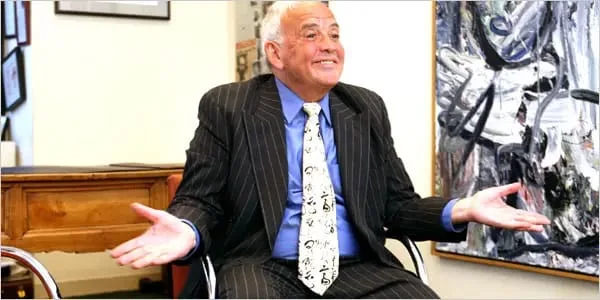The Career of Martin Garbus: From Young Lawyer to Legal Icon
Martin Garbus stands among the most influential and outspoken lawyers in modern American legal history. Over a career spanning more than six decades, he has defended writers, artists, dissidents, and political figures, earning a reputation as one of the nation’s foremost advocates for free speech and civil liberties. His life’s work stretching from local courtrooms in New York to international tribunals and classrooms around the world reflects a passionate belief in the power of law to protect democracy and individual rights.
Early Life and Legal Formation
Born in Brooklyn in 1934, Martin Garbus grew up in a working-class family and attended the Bronx High School of Science. He went on to earn his bachelor’s degree from Hunter College and his law degree from New York University School of Law. Before entering the legal world, he held a range of jobs, including factory work and taxi driving, experiences that deepened his understanding of ordinary people’s struggles and informed his sense of justice. After serving in the U.S. Army, he began practicing law in New York, where his energy, intellect, and willingness to take on unpopular causes quickly set him apart.
Garbus’s early legal work brought him into contact with the American Civil Liberties Union and other public interest organizations. In the social and political upheaval of the 1960s, he became deeply involved in civil-liberties litigation, fighting on behalf of individuals whose rights were threatened by government overreach and public censorship. His formative years in these arenas established the foundation for a career that would bridge law, politics, and culture.
Landmark Litigation and the Growth of a Reputation
One of Garbus’s earliest and most significant contributions to American jurisprudence came through his involvement in Goldberg v. Kelly (1970), a landmark Supreme Court case that reshaped the meaning of due process in administrative law. The Court ruled that certain public benefits could not be terminated without a fair hearing, a principle that expanded procedural protections for millions of Americans. Garbus’s participation in the litigation demonstrated both his strategic acumen and his enduring concern for justice for society’s most vulnerable.
Throughout his career, Garbus developed a reputation as a fearless defender of the First Amendment. He took on numerous cases involving obscenity, defamation, and artistic expression, representing figures whose work had sparked public outrage or legal controversy. Among his clients were comedian Lenny Bruce, author Salman Rushdie, playwright Václav Havel, Nobel laureate Andrei Sakharov, and even former South African president Nelson Mandela. Whether defending controversial art or political dissent, Garbus consistently argued that free speech must be protected even and especially when it challenges prevailing norms.
His courtroom style became legendary: passionate, theatrical, and deeply persuasive. Colleagues and adversaries alike recognized his ability to blend intellectual rigor with human empathy, turning complex constitutional arguments into compelling stories about individual freedom. As his reputation grew, he was sought after by clients from diverse fields, including literature, entertainment, and politics, all of whom turned to him when the stakes were high.
Teaching, Writing, and International Influence
Beyond the courtroom, Martin Garbus’s influence extended into academia and international advocacy. He served as a Fulbright scholar in China and lectured at law schools and legal institutions across the world, sharing his insights on constitutional rights and media law. His work advising emerging democracies in Eastern Europe, Africa, and Asia on freedom of expression and judicial reform reflected his belief that legal principles should transcend national boundaries.
Garbus also established himself as an accomplished author and public intellectual. His books, including Ready for the Defense and Traitors and Heroes, combine personal memoir with analysis of landmark cases, offering readers a vivid look at the moral and political dimensions of law. He has written extensively for newspapers and journals, and his voice has frequently appeared in public debates on censorship, human rights, and political ethics. The 2009 HBO documentary Shouting Fire: Stories from the Edge of Free Speech, directed by his daughter Liz Garbus, brought his life’s mission to a wider audience and cemented his status as a cultural as well as legal figure.
Style, Reputation, and Controversy
Martin Garbus’s legal persona has often been described as both bold and uncompromising. His readiness to represent controversial clients whether dissidents abroad or divisive figures at home earned him admiration from some quarters and criticism from others. Yet this willingness to confront difficult cases is precisely what made him such a defining figure in American law. He has received numerous awards for his contributions to civil liberties, including honors from the Fulbright Association and the PEN American Center. Still, Garbus has never shied away from the contentious side of advocacy, arguing that defending the unpopular is essential to the integrity of the legal profession.
Later Career and Continuing Engagement
Even well into his later years, Garbus has remained active in both litigation and public affairs. In the 2010s and 2020s, he continued to handle complex, high-profile cases, including environmental disputes and cases involving corporate accountability. He has also spoken out about the ethical responsibilities of lawyers in moments of political crisis, publicly calling for disciplinary action against attorneys he believed undermined democratic institutions, such as his criticism of former New York mayor Rudy Giuliani after the 2021 Capitol insurrection. Though advancing age has slowed his courtroom appearances, Garbus continues to write, advise, and advocate on behalf of causes that echo the principles he has championed for decades.
Conclusion
The career of Martin Garbus is a vivid illustration of how law can be both a profession and a moral calling. From his early days as a young lawyer in New York to his status as a global authority on free speech, Garbus has never stopped testing the boundaries of what justice demands. His work in cases like Goldberg v. Kelly transformed constitutional law, while his defense of artists, writers, and political dissidents helped preserve the space for dissent that lies at the heart of democratic society. Equally at home in the courtroom, the classroom, and the public square, he has spent a lifetime demonstrating that the lawyer’s craft when joined to conscience can indeed shape the world.




